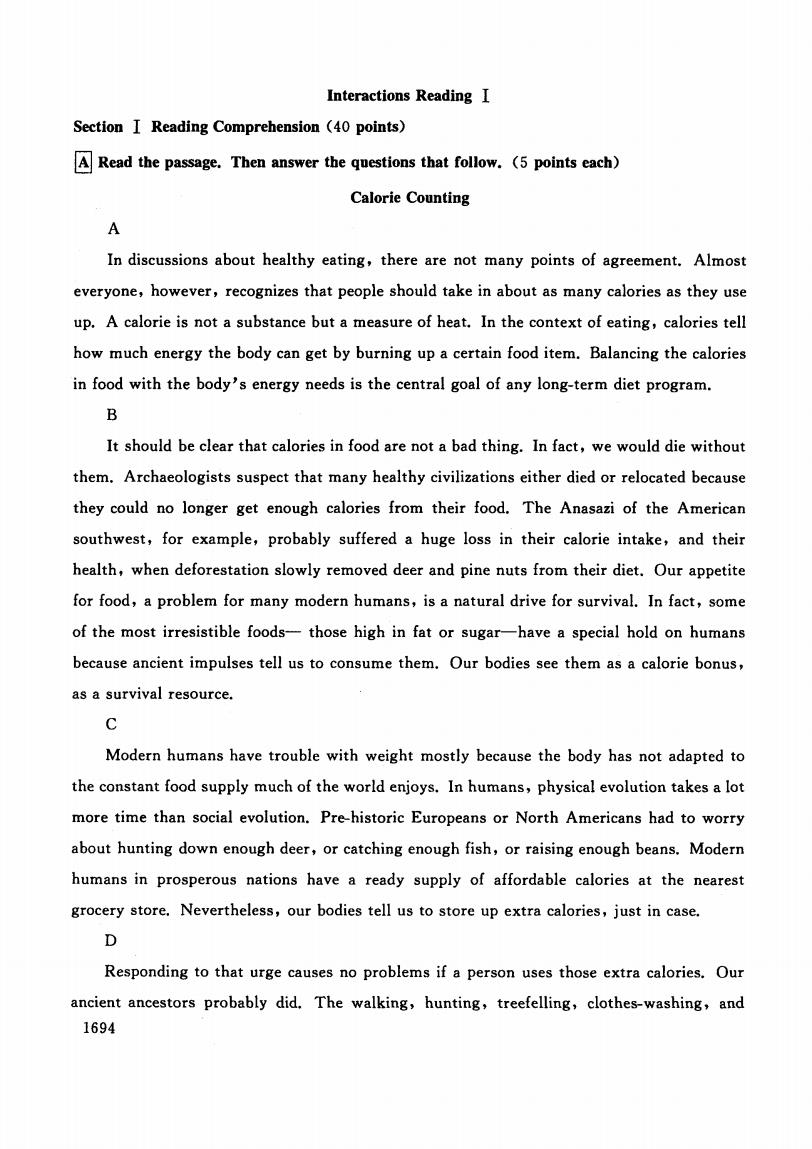正在加载图片...

Interactions Reading I Section I Reading Comprehension (40 points) A Read the passage.Then answer the questions that follow.(5 points each) Calorie Counting A In discussions about healthy eating,there are not many points of agreement.Almost everyone,however,recognizes that people should take in about as many calories as they use up.A calorie is not a substance but a measure of heat.In the context of eating,calories tell how much energy the body can get by burning up a certain food item.Balancing the calories in food with the body's energy needs is the central goal of any long-term diet program. B It should be clear that calories in food are not a bad thing.In fact,we would die without them.Archaeologists suspect that many healthy civilizations either died or relocated because they could no longer get enough calories from their food.The Anasazi of the American southwest,for example,probably suffered a huge loss in their calorie intake,and their health,when deforestation slowly removed deer and pine nuts from their diet.Our appetite for food,a problem for many modern humans,is a natural drive for survival.In fact,some of the most irresistible foods-those high in fat or sugar-have a special hold on humans because ancient impulses tell us to consume them.Our bodies see them as a calorie bonus, as a survival resource. C Modern humans have trouble with weight mostly because the body has not adapted to the constant food supply much of the world enjoys.In humans,physical evolution takes a lot more time than social evolution.Pre-historic Europeans or North Americans had to worry about hunting down enough deer,or catching enough fish,or raising enough beans.Modern humans in prosperous nations have a ready supply of affordable calories at the nearest grocery store.Nevertheless,our bodies tell us to store up extra calories,just in case. D Responding to that urge causes no problems if a person uses those extra calories.Our ancient ancestors probably did.The walking,hunting,treefelling,clothes-washing,and 1694Interactions Reading I 配tion I Reading Comprehension (40 points) the passa俱Then answer 伽questions 伽t follow. (5 酬nts each) Calorie Counting A In discussions about healthy eating , there are not many points of agreement. Almost everyone , however, recognizes that people should take in about as many calories as they use up. A calorie is not a substance but a measure of heat. In the context of eating , calories tell how much energy the body can get by burning up a certain food item. Balancing the calories in food with the body's energy needs is the central goal of any long-term diet program. B It should be clear that calories in food are not a bad thing. In fact , we would die without them. Archaeologists suspect that many healthy civilizations either died or relocated because they could no longer get enough calories from their food. The Anasazi of the American southwest , for example , probably suffered a huge loss in their calorie intake , and their health , when deforestation slowly removed deer and pine nuts from their diet. Our appetite for food , a problem for many modern humans, is a natural drive for survival. In fact , some of the most irresistible foods- those high in fat or sugar-have a special hold on humans because ancient impulses tell us to consume them. Our bodies see them as a calorie bonus, as a survival resource. C Modern humans have trouble with weight mostly because the body has not adapted to the constant food supply much of the world enjoys. In humans, physical evolution takes a lot more time than social evolution. Pre-historic Europeans or North Americans had to worry about hunting down enough deer, or catching enough fish , or raising enough beans. Modern humans in prosperous nations have a ready supply of affordable calories at the nearest grocery store. Nevertheless, our bodies tell us to store up extra calories, just in case. D Responding to that urge causes no problems if a person uses those extra calories. Our ancient ancestors probably did. The walking , hunting , treefe11ing, clothes-washing , and 1694